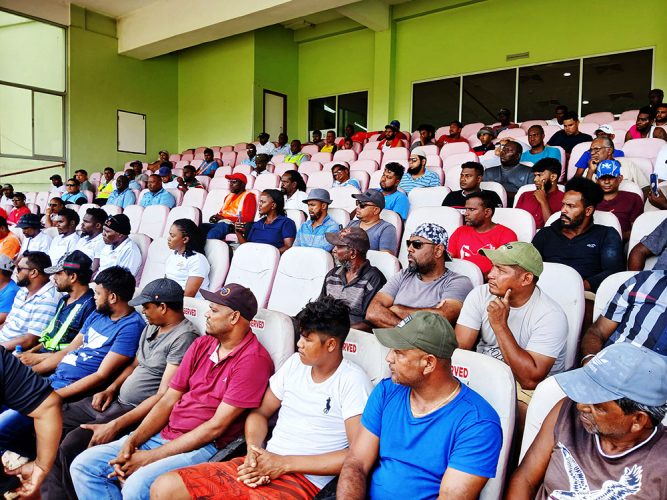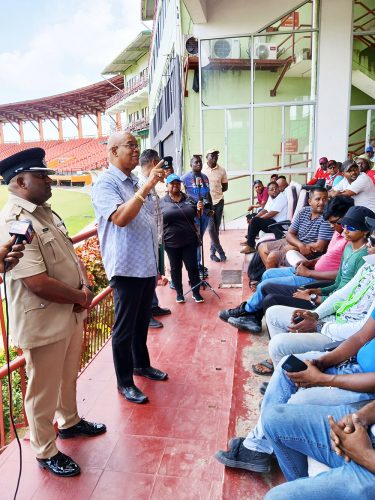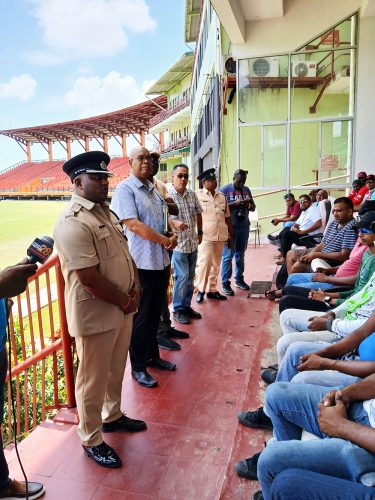By Antonio Dey
Owners and operators of trucks and articulated vehicles were yesterday put on notice that the government will soon install road scales to avert the significant damage being done by heavy-laden trucks.
This was disclosed by Public Works Minister Juan Edghill during a meeting with truck drivers who operate articulated, low bed, haulers and heavy goods vehicles, at the Guyana National Stadium, Providence, East Bank Demerara.
Edghill said that overloaded and speeding trucks that continue to damage public roads create added expenses for the ministry.

He suggested that smaller vehicles utilise the smaller roads to accommodate the magnitude of commercial traffic, while large vehicles use the larger roads to avoid damage to the public infrastructure.
“When we are supposed to be focusing on developing other roads we have to now rebuild or redo roads that are damaged because of errant drivers and contractors, and that is costing us a lot,” Edghill lamented.
Road scales will calibrate the tonnage of trucks, and those who have exceeded the limit will have to be held accountable, the minister warned.

He also revealed that the government will be partnering with the Guyana Revenue Authority to suspend the licences of those truck operators who usually drive during the wee hours of the morning without taking a rest.
The minister said it was unfair and unconscionable for trucking companies to have their employees behind the wheel for over 15 hours without taking a break and worst yet traversing the roadways during “ridiculous hours in the morning”. He said such drivers posed a danger as they could cause serious fatalities due to “exhaustion or lack of rest”.
Deputy Police Commissioner – Operations Ravindradat Budhram admitted that while there were some police officers who apprehend drivers wrongfully based on complaints, it was important to note that there were truck drivers who took four to five trips a day. Because of tiredness, they might ask someone who was inexperienced or not a valid licence holder to operate their vehicles, he added. Budhram said that this was “totally unacceptable”.
He also pointed to poor maintenance of motor lorries as most times drivers don’t do thorough inspections to make sure that all of their vehicles’ accessories are intact. According to him, this habit once adopted by all truck drivers could reduce the nation’s road carnage.
He also chided truck drivers who obstruct the flow of traffic. “You cannot be travelling on the East Bank and suddenly realise that oh my fuel is low. Your gas tank must be filled at all times, because when you stop in the middle of the traffic it can cause a significant delay. Drivers need to be more responsible,” he admonished.

Budhram stated that all road users are required to adhere to the law and demonstrate a high level of alertness and precaution to mitigate road fatalities.
‘No need for speed’
Like Minister Edghill, he also criticised those drivers who are in the habit of driving heavy tonne vehicles at high speed, especially during the night.
“There is no need for speed. Excess speeding and alcohol are the main causes of fatal accidents. The traffic chief can tell you… I know most of you may have families. Do you want to be charged unnecessarily all because of recklessness or do you want to be a compliant road user?” he asked. “Use the roadway with care. It is a serious issue. I urge you to maintain your vehicles, don’t wait for something to occur.”
Traffic Chief Senior Superintendent Mahendra Singh remarked, “Most of you are operators of large trucks or are operators on behalf of others, nevertheless your actions should not negatively impact others or road users.
“Statistics have shown from last September to now that 17 persons have lost their lives owing to the actions of lorry drivers. I don’t think any of you are here but we have documented these instances and I can say that several of these persons were charged with dangerous driving. If you are more compliant with the rules and regulations governing road safety there would be fewer accidents.”
He continued “… The country is on the cusp of development and do you think that your errant behaviour is doing any good to the development? No it is not. I don’t know how proud some of you feel, but think economically. If every four weeks you are charged for committing an offence, stop to think how that would impact your families. We have to adopt a sense of self-pride and stop this lawlessness.”
On this note, the Traffic Chief also implored truck drivers to not hesitate to report if they were wrongfully charged by a member of the police force.
Minister Edghill chimed in to warn truck drivers carrying quarry materials to desist from leaving them on the road for a protracted period. He noted that this trend by most heavy tonne trucks served as an encumbrance and inconvenience for other road users.
Several truck drivers then lamented that they often don’t have anywhere to store these materials and the road was the only viable option.
Edghill recommended that the materials could be stored on leased land.
Women drivers
Edghill also appealed to them to exercise more compassion and precaution when they spot women drivers. According to him, many times women complain bitterly about the recalcitrance and callousness of heavy-duty truck drivers.
“It is ethical for you as a male to pull over if you see a female coming through in a busy lane, especially on those public roads,” he stated.
There were a few rebuttals and one driver claimed that women often showcased timidity on the roadways and sometimes drove awkwardly.
The minister, in response to this, said, “Well still, my brother, you have to be patient with our female drivers on the roadways. You see them driving in a busy lane, pull over to prevent yourself from being overtaken.”
He also criticised truck drivers who disregard the sirens of emergency vehicles. “What happen? You guys don’t hear the sirens? Many times you would see these sirens and not pull over,” Edghill noted.
Speaking for several of his colleagues, one driver said, “Sir, sometimes we hardly hear it and there are times these emergency vehicles would leave the siren lights on so we don’t know when it is an emergency, or when there is a need to stop. The police, especially, got to act more responsibly.”
Edghill responded, “Well I will tell you this. Still do the right thing and pull over. Mr Budhram and Mr Singh will deal with those police ranks who are doing that, but according to the law, you must pull over when you see these emergency vehicles coming.”


